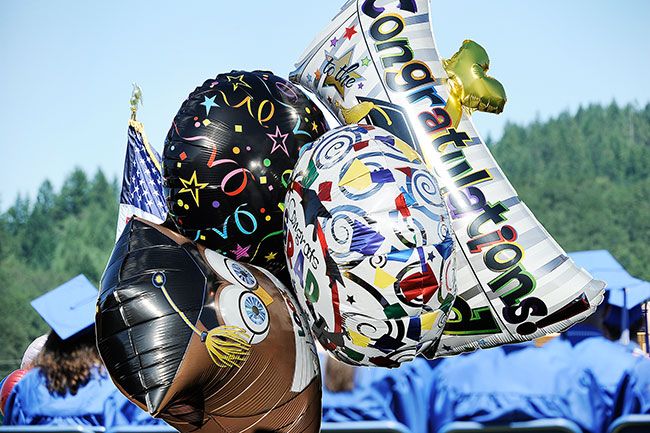Starla Pointer: Commencement etiquette
Graduation should be a happy occasion during which students are honored and their years of achievement celebrated.
It’s a formal event. It should be treated that way — for the benefit of all graduates and the parents, other relatives, teachers and friends who have supported them over the years.
More than 1,100 students are graduating from Yamhill County high schools this year. Willamina High, which traditionally opens graduation season, will graduate its 44-member class Saturday. The bulk of the commencement events will follow two weeks later: McMinnville and Newberg, June 10; Amity, Dayton and Sheridan Saturday, June 11; and Yamhill-Carlton Sunday, June 12.
The county also will recognize hundreds of students who completed Chemeketa Community College, George Fox College in Newberg and Linfield College in McMinnville — Linfield’s graduation is this Sunday morning.
The graduates themselves will be nervous, excited, happy, a little sad about leaving friends, perhaps somewhat worried about the future, even though they’re eager for new experiences. In many cases, they will decorate their mortarboards to make the event more personal — adding a name, a number, a toy, an exclamation of joy or a message to supporters.
Otherwise, though, the Yamhill County graduates will respect the formality of the occasion, pay attention to the speakers, and conduct themselves like the mature young adults they are.
If only I could say the same for the audience.
As local commencement ceremonies have become more decorous over the years, there’s been a corresponding relaxation of etiquette in the grandstands.
Of course, I’m referring to a fairly small percentage of the crowd; most relatives and friends are respectful. But the minority can turn an event that should be a happy memory into one we groan about.
Here’s just one example from a graduation I covered a year or two ago:
The band strikes up “Pomp and Circumstance.” The proud graduating seniors begin marching into the stadium. The crowd stands in honor of the students.
No, wait: SOME of the crowd stands. Others remain seated, many bent over their cell phones, thumbs flying.
I’m standing, of course, because that’s what I should be doing. And the woman behind me — I saw her walk in, and am pretty sure she is fully capable of standing, too -- pokes me and says, “You’re blocking my view.”
I move over a little. Eventually, she rises, snaps a shot of her particular graduate, then sits down again.
Did this woman, and dozens of others in that section of the grandstand, simply not know they should stand while the graduates and faculty are on the march?
Did they not realize, later, they should also stand when the color guard marched in with the U.S. and Oregon flags? That’s proper protocol: You stand, hand over heart, while the American flag passes by.
Have we become a nation of individuals, concerned only with our own comfort and caring little about the people around us? Or, have we simply forgotten how to act in public because we’ve spent too much time alone behind our small screens?
Really, when attending a graduation or another public event, all you need to do is use common courtesy.
Be pleasant to those around you. Scoot over a little to let one more person sit down, and if you’re the beneficiary of such a seat, say thank you. Don’t be disruptive; make sure others can hear what’s going on. Turn off your cell phone — at the very least put it on silent and keep it away.
When you attend a commencement ceremony, you’re probably there to see one particular graduate, or perhaps your daughter or son and a few of his or her friends. But you should behave as if you’re honoring your graduate’s entire class.
Sure, the ceremony takes awhile. But don’t leave early; this is a significant event in the life of your graduate and your entire family.
Stand up for everyone, whether for 44 graduates or 444. Watch them all cross the stage.
Area high schools with small graduating classes make commencement even more special by reviewing each student’s plans or having multiple speakers and performers. Even at Mac High, with a graduating class of close to 500, it’s thrilling to witness every graduate receive a diploma and bounce happily back to his or her seat.
And, if you’re going to cheer when your grad’s name is called, make it brief so the succeeding graduate’s name can be heard directly by the rest of the crowd.
If you move to the front of the stadium to take photos, try not to block anyone’s view. You may opt to leave the picture-taking for later, when you can get really good pictures close-up.
And please, I beg you, present that giant balloon bouquet to your graduate at home, either before or after the ceremony. Balloons always interfere with other people’s views, and sometimes they escape, floating skyward during the principal’s address.
If I could change only one feature of local graduations: I would install a “balloon check” station, where people could park those Mylar bouquets until after the ceremony.
If I could change another aspect, I would urge everyone in the crowd to behave as respectfully as the graduates themselves.











Comments
BT
Some of the responsibility has to laid at the feet of the organizers. Not everyone knows the protocol. It would help, for example, before the processional and recessional and other activities to have an announcer say, "Please rise and remain standing for the ..." or "Please rise and gentlemen remove your hats for the ..." Similarly, a comment on the solemnity of the event might reduce raucous cheering. This would be in addition to any directives written in the program. Sometimes audiences need a little prompting to do the right thing.
Mudstump
I attended a parade in Cannon Beach and was surprised at how many people sat on the curb when the American and state flag passed by. People of my generation were taught rules of etiquette....stand, place your hand over your heart and men removed their hats. I don't think we cover those things at school or at home anymore. I like BT's suggestions.
JonlyBonly
I agree - it always helps if directives are given for events that, after all, are rare in one's life; people's being ignorant of courtesies/protocols are more the rule than exception, which is not a criticism, just an observation. Most want to do the right thing.
Lulu
With all these ambitious programs at the high school--teaching horticulture, welding, robotics--how about a class in etiquette?